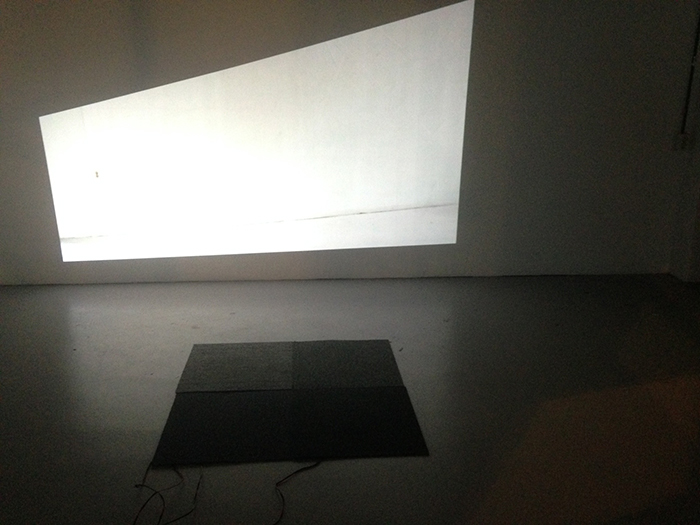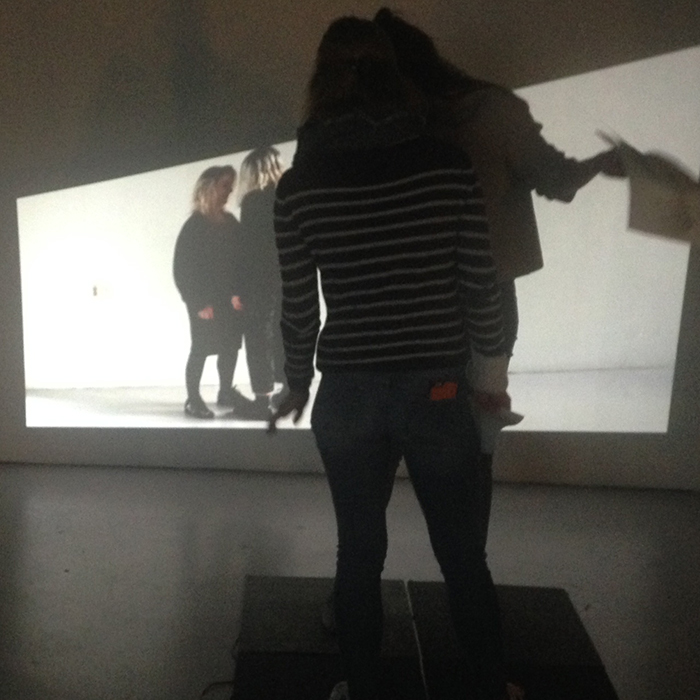Monika & Published & Destroyed this: Difference between revisions
| Line 1: | Line 1: | ||
=I am a group= | =I am a group= | ||
Two bodies generate value together. Visitors can activate a video by finding the right positions on a square mat. What is hard to do by oneself, is possible to do together if two are willing to be close to each other. | Two bodies generate value together. Visitors can activate a video by finding the right positions on a square mat. What is hard to do by oneself, is possible to do together if two are willing to be close to each other. The image in the video reflects a similar view that is performed by visitors. | ||
[[File:IMG_5761.JPG]] | [[File:IMG_5761.JPG]] | ||
Revision as of 17:18, 13 February 2016
I am a group
Two bodies generate value together. Visitors can activate a video by finding the right positions on a square mat. What is hard to do by oneself, is possible to do together if two are willing to be close to each other. The image in the video reflects a similar view that is performed by visitors.
Processing code:
import processing.serial.*;
import processing.video.*;
Movie myMovie; Movie myMovie2; Serial ser;
int width = 640; int height = 360;
void setup() {
size(640, 360); //surface.setSize(width, height);
println(Serial.list()); ser = new Serial(this, Serial.list()[2], 9600); myMovie = new Movie(this, "empty-480.mov"); myMovie.loop(); myMovie2 = new Movie(this, "people-480.mov"); myMovie2.loop();
}
void draw() {
background(0);
//fill(20);
image(myMovie, 0, 0);
//tint(255, 120);
//println( "!!!!");
while (ser.available() > 0) {
int inByte = ser.read();
println(inByte);
image(myMovie2, 0, 0);
}
}
// Called every time a new frame is available to read void movieEvent(Movie m) {
m.read();
}
Arduino button code: /*
Button
Turns on and off a light emitting diode(LED) connected to digital pin 13, when pressing a pushbutton attached to pin 2.
The circuit: * LED attached from pin 13 to ground * pushbutton attached to pin 2 from +5V * 10K resistor attached to pin 2 from ground
* Note: on most Arduinos there is already an LED on the board attached to pin 13.
created 2005 by DojoDave <http://www.0j0.org> modified 30 Aug 2011 by Tom Igoe
This example code is in the public domain.
http://www.arduino.cc/en/Tutorial/Button */
// constants won't change. They're used here to // set pin numbers: const int buttonPin2 = 2; const int buttonPin3 = 3; const int buttonPin4 = 4; const int buttonPin5 = 5;
const int ledPin = 13; // the number of the LED pin
// variables will change: int buttonState2 = 0; int buttonState3 = 0; int buttonState4 = 0; int buttonState5 = 0;// variable for reading the pushbutton status
void setup() {
Serial.begin(9600); // initialize the LED pin as an output: pinMode(ledPin, OUTPUT); // initialize the pushbutton pin as an input: pinMode(buttonPin2, INPUT_PULLUP); pinMode(buttonPin3, INPUT); pinMode(buttonPin4, INPUT); pinMode(buttonPin5, INPUT);
}
void loop() {
// read the state of the pushbutton value: buttonState2 = digitalRead(buttonPin2); buttonState3 = digitalRead(buttonPin3); buttonState4 = digitalRead(buttonPin4); buttonState5 = digitalRead(buttonPin5);
// Serial.print( buttonState2 ); // Serial.print( " " ); // Serial.print( buttonState3 ); // Serial.print( " " ); // Serial.print( buttonState4 ); // Serial.print( " " ); // Serial.print( buttonState5 ); // Serial.println( " " );
// check if the pushbutton is pressed.
// if it is, the buttonState is HIGH:
if (buttonState2 == 1 &&
buttonState3 == 1 &&
buttonState4 == 1 &&
buttonState5 == 1) {
// turn LED on:
digitalWrite(ledPin, HIGH);
Serial.print(1);
}
else {
digitalWrite(ledPin, LOW);
// Serial.print(0);
}
}

